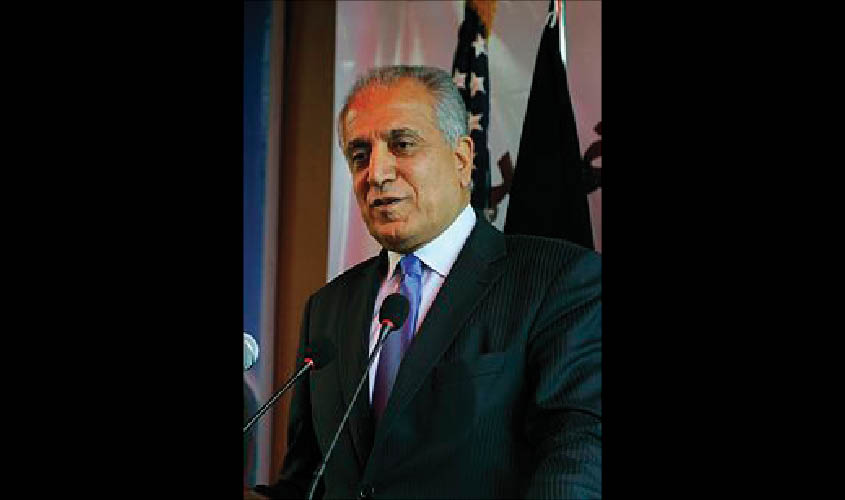US Ambassador to Afghanistan is making steady, and deadly, progress in a GHQ inspired crusade to install the Taliban within the Ashraf Ghani government.
Anybody at the level of high policy would have come across the truism that only a mentally challenged individual would believe that the same thing done the same way over and over again would produce a different result. And yet, Prime Ministers and Presidents choose with metronomic regularity precisely those individuals who have failed multiple times earlier to handle the same tasks. President George W. Bush was a disaster where Afghanistan was concerned, and not just because he was always more interested in taking revenge on Saddam Hussein “for trying to kill Poppy” than in setting right the land of the Taliban. Both he and Dick Cheney accepted the conventional (Pakistan army-centric) wisdom of the CIA and the Pentagon, entrusting the battling of Wahhabi extremist violence to the very institution that was motivating and assisting such violence, GHQ Rawalpindi. From the day the duo rejected A.B. Vajpayee’s offer of assistance in favour of riding on Musharraf’s coattails, the war was lost. The Taliban was revived from near-death by the ISI, which helpfully suggested thousands of “moderate Pashtuns” that the US could fund, choices that accepted without any fact check on whether those being promoted by Musharraf’s men were indeed “moderate”. They were not, they were hardcore Taliban, and the hundreds of millions of taxpayer dollars that went to them ensured that the US and its allies went on the defensive in Afghanistan by 2007.
Among the prime boosters of GHQ Rawalpindi and the “benefits of doing a deal with the Taliban via the medium of the ISI” (as during the 1979-89 Afghan war with the Soviets) was Zalmay Khalilzad, a favourite of the Bush administration and now ensconced as the Oracle on Afghanistan by the White House. Say this for Khalilzad, he is reliably predictable, and has not changed his views since the 1990s on how Washington should manage the situation in Afghanistan. Exactly as he told Bush and Cheney in 2001, he has persuaded John Bolton to get President Trump to send Khalilzad to Kabul as the High Representative of the Unipolar Superpower. In this task, he is making steady—and deadly—progress in a GHQ-inspired crusade to install the Taliban within the core of the Ashraf Ghani government, thereby destroying it from within. In the meantime, the loss of morale and the confusion in policy created by Khalilzad has led to a steady accretion in the extent of land controlled by the Taliban. In these areas, women are once again told to remain at home (or else), while young girls are shooed away from even the most rudimentary of formal education. Law is what a local Taliban mullah defines it to be, while any deviation from Wahhabism is met with torture, if not death. Should this ragtag militia of extremists once again retake Kabul, the “credit” will go to Khalilzad, just as their earlier rise to power in the mid-1990s was in large part because of their Fairy Godmother, Robin Raphel, a favourite of both the Pakistani diplomat Shafqat Kakakhel as well as President W. J. Clinton. Every fresh terror attack by the Taliban morphs into yet another flurry of activity by “Our Zal” to force Ashraf Ghani to accept Taliban representatives in the elected government, rather than show him the folly of asking Trump to continue on the sterile paths of Presidents Clinton and Bush in Afghanistan.
Those who ran US policy towards Afghanistan in the past continue to remain the very domain specialists recruited by the State Department, the Pentagon and the National Security Council to formulate policy on a country wrecked by errors made by the three agencies. Of them, it is only the Pentagon that seems to be coming out of the haze of toxic policy options pushed by Khalilzad and others anchored in the past, who have remained unscathed in their careers despite their policies having ended in disaster. Both the NSC as well as State are foursquare behind “our man Zal” in Afghanistan as he acts as the ventriloquist’s dummy for GHQ Rawalpindi. Distracted as he is with the fallout of the Mueller probe and the upcoming 2020 elections, President Trump has not been able to ensure a new approach that would protect the people of Afghanistan from the Wahhabi fanatics being promoted so obsessively by Khalilzad. The people of Afghanistan are overall moderate, as witnessed by the profusion of Hindu, Sikh and Buddhist places of worship even in the Pashtun heartland, structures that were subsequently torn down by Raphel and Khalilzad’s heroes, the Taliban. Toxic policy concocted in Washington by those nostalgic for the Clinton-Bush years has resulted in a betrayal of the people of Afghanistan, especially women, youth and moderate Pashtuns. Unfortunately, probably as a consequence of hints from Washington, the policy of India towards the Taliban has wobbled on occasion. Such equivocation must stop, Ashraf Ghani must by now have understood that Hamid Karzai was correct in his view that following Washington’s dictates would lead to his whole country entering the hell that is Taliban rule. Another Wahhabi state must not be allowed to form in South Asia. Khalilzad may have made a habit of betraying the Afghans, but India needs to stand on the side of the moderate majority in Afghanistan who seek the Rule of Law, rights for all, and equality of treatment for women with men and not this extremist militia. Adopting Khalilzad’s nostrums will only multiply the number of victims of extremism in Afghanistan, a figure that is rising by the day as the US High Representative continues with his leaps into the policy quagmires of the past.

